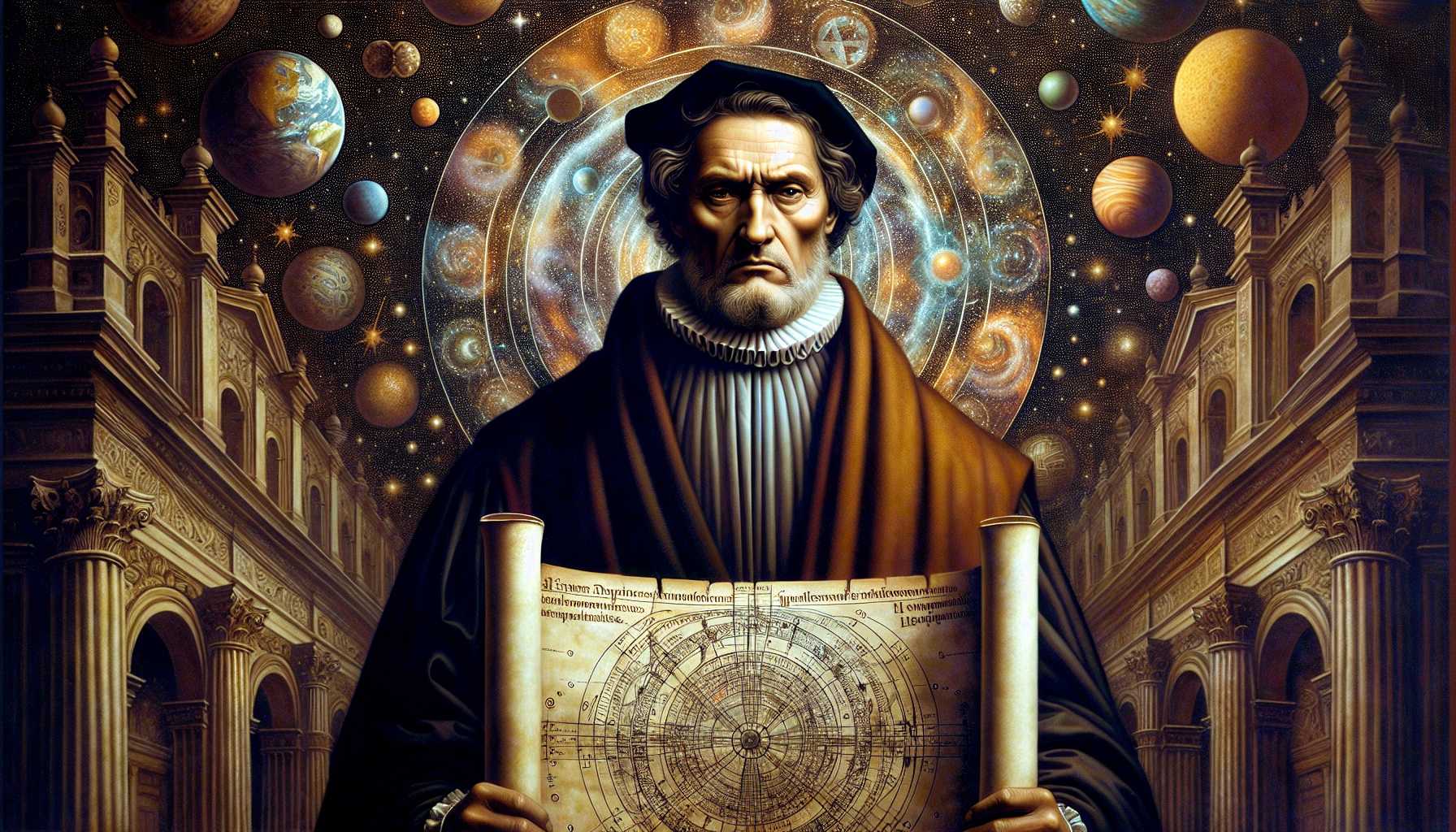
Giordano Bruno The Philosopher Who Challenged the Universe
Giordano Bruno was an Italian philosopher, cosmologist, and poet of the Renaissance who is best known for his proposal of an infinite universe and the plurality of worlds.
Jorudāno Burūno wa, mugen no uchū to tayō na sekai no teian de mottomo yoku shirarete iru Runesansu no Itaria no tetsugakusha, uchūronsha, shijin deshita.
ジョルダーノ・ブルーノは、無限の宇宙と多様な世界の提案で最もよく知られているルネサンスのイタリアの哲学者、宇宙論者、詩人でした。
He challenged the geocentric model of the universe, advocating instead for a heliocentric view and a vast universe filled with numerous stars and planets, many of which could potentially support life.
Kare wa uchū no chikyū chūshin moderu ni chōsen shi, kawari ni taiyō chūshin no mikata to kazu ōku no hoshi to wakusei ni michita kōdai na uchū o teishō shi, sono ōku ga seimei o sasaeru kanōsei ga aru to shuchō shimashita.
彼は宇宙の地球中心モデルに挑戦し、代わりに太陽中心の見方と数多くの星と惑星に満ちた広大な宇宙を提唱し、その多くが生命を支える可能性があると主張しました。
Bruno's ideas were controversial and opposed to the prevailing beliefs of his time, particularly those of the Catholic Church, leading to significant conflict over his views.
Burūno no kangae wa buzui o kamoshi, kare no jidai no shihai-teki na shinnen, toku ni Katorikku kyōkai no shinnen ni hantai suru mono de ari, kare no kenkai o meguru jūyō na tairitsu e to tsunagarimashita.
ブルーノの考えは物議を醸し、彼の時代の支配的な信念、特にカトリック教会の信念に反対するものであり、彼の見解を巡る重要な対立へとつながりました。
Bruno's philosophies extended beyond cosmology into metaphysics, emphasizing concepts such as the unity of existence and the importance of individual intuition.
Burūno no tetsugaku wa uchūron o koete keijijōgaku ni made oyobi, sonzai no tōitsu ya koko no chokkaku no jūyō-sei to itta gainen o kyōchō shimashita.
ブルーノの哲学は宇宙論を超えて形而上学にまで及び、存在の統一や個々の直感の重要性といった概念を強調しました。
He was influenced by Neoplatonism and the Hermetic tradition, which shaped his thoughts on the divine and the nature of matter.
Kare wa shin Puraton shugi to Herumesuteki dentō no eikyō o ukete ori, kore wa kare no shinsei to busshitsu no honshitsu ni tsuite no kangae o keisei shimashita.
彼は新プラトン主義とヘルメス的伝統の影響を受けており、これは彼の神聖と物質の本質についての考えを形成しました。
His works included discussions on the infinite nature of the universe, the soul's immortality, and the interconnection of all things.
Kare no sakuhin ni wa uchū no mugen no seishitsu, tamashī no fushi, oyobi subete no mono no sōgo setsuzoku ni kansuru giron ga fukumaれて imashita.
彼の作品には宇宙の無限の性質、魂の不死、およびすべての物の相互接続に関する議論が含まれていました。
However, his radical ideas ultimately resulted in his persecution; he was tried by the Inquisition and executed in 1600 for heresy.
Shikashi, kare no kageki na kangae wa saishūteki ni kare no hakugai ni tsunagarimashita. Kare wa itande no tame ni shūkyō saiban ni kakerare, 1600-nen ni shokei saremashita.
しかし、彼の過激な考えは最終的に彼の迫害に繋がりました。彼は異端のために宗教裁判にかけられ、1600年に処刑されました。
Despite his tragic end, Bruno's legacy persists, as he is recognized as a forerunner of modern science and philosophy, influencing future thinkers and contributing to the transformation of the scientific worldview.
Kare no higeki-teki na ketsumatsu ni mo kakawarazu, Burūno no isan wa ima mo nokotte ori, kare wa gendai no kagaku to tetsugaku no senkusha to shite ninshiki sare, shōrai no shisōka ni eikyō o ataete, kagaku-teki sekaikan no henka ni kiyo shimashita.
彼の悲劇的な結末にもかかわらず、ブルーノの遺産は今も残っており、彼は現代の科学と哲学の先駆者として認識され、将来の思想家に影響を与え、科学的世界観の変革に寄与しました。
His courage in defending his beliefs has made him a symbol of free thought and intellectual resistance against dogma.
Kare no shinnen o mamoru yūki wa, kare o jiyū na shikō to kyōgi ni taisuru chiteki teikō no shōchō to shimashita.
彼の信念を守る勇気は、彼を自由な思考と教義に対する知的抵抗の象徴としました。
Today, he is often celebrated for his contributions to the understanding of the universe and his bold vision of a reality beyond conventional limitations.
Kyō, kare wa uchū no rikai e no kōken to, jūrai no genkai o koeta genjitsu no daitan na bijon de shibashiba tataerarete imasu.
今日、彼は宇宙の理解への貢献と、従来の限界を超えた現実の大胆なビジョンでしばしば称えられています。
Based on this article
